前半
Part1
後半
Part2
<サイエンスアゴラ2016の総括・パネル討論>/<General Summary of the Science Agora 2016/Panel Discussion>
<授賞式>/<Award Ceremony>
11回目を数える今年のサイエンスアゴラを締めくくる閉幕セッションでは、開催趣旨を振り返り、成果を総括するとともに、今後のアゴラが目指すビジョンや、今の科学技術が抱える課題について議論が交わされました。
The Closing Session of the 11th Science Agora, convened this year, looked back on the objectives of the forum and summarized the results. Discussions were also exchanged about the vision of future Science Agora, and the challenges faced by science and technology today.
閉幕セッションの冒頭、科学技術振興機構 副理事の渡辺氏より、今年のビジョン「つくろう科学とともにある社会」とテーマとの関係について説明がありました。このビジョンを基に、「科学によって社会がどう変わるのか」、また逆に「社会の要請を受けて科学はどう変わるのか」、そして両観点において「リスクとどう調和するのか」という3つの長期的な課題を意識し、「医・食・くらし」「教育・文化芸術・スポーツ」「震災復興5年」のテーマを掲げたといいます。特に、3つ目のテーマについては、東日本大震災から5年を経て「何を解決でき、何が解決できず課題として残ったのか」に注目したと振り返りました。実際には震災関連企画はブースを含め21件の対話が実施され、特に開幕セッションでは、福島と熊本の高校生らを交え、これからを生き、未来を作る若者の視点を中心に対話が繰り広げられたこと、また、今年はキーノートセッションを一般公募とし、登壇者に若者や外国の方を多く迎え入れ、企業参加数もほぼ倍増するなど、これまで以上に開かれた、多様性の拡大に成功した総会だったことが、渡辺氏より総括されました。
At the start of the Closing Session, Miyoko O. Watanabe, Deputy Executive Director, Japan Science and Technology Agency (JST), explained the relationship between the themes and the vision for Science Agora 2016, “Let’s build a society harmonized with science.” Based on this vision, the themes of “Medical care, Food and Lifestyle,” “Education, Culture and Art, and Sports,” and “Five Years of Reconstruction Following the Disaster” were set with an awareness of the three long-term issues: “Transformation in Society led by Science,” conversely “Transformation in Science led by Society,” and based on these two perspectives, “Living in Harmony with Risks.” In particular, with respect to the three themes, the forum looked back on the five years that have passed since the Great East Japan Earthquake while placing the focus on the issues we have resolved, and the remaining issues that need to be resolved. Various dialogues were held as part of the earthquake-related project, including the booth exhibits. Watanabe summarized that of particular note was the dialogue that took place during the Opening Session, which included high school students from Fukushima and Kumamoto and which focused on the perspectives of young people who have a future ahead of them and who will shape the future. She further highlighted that this year the forum was successfully made more open and diverse than before by having an open call for organizers of the keynote session, welcoming many young panelists and foreign panelists, as well as nearly doubling the number of participating companies.
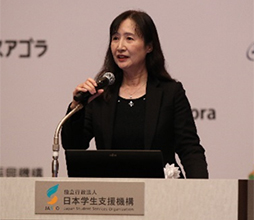
パネル討論では、サイエンスアゴラ2017年度活動のためのビジョンの素案とテーマの素案(キーワード)を基に、「科学と社会」を巡る課題について討論が行われ、ファシリテーターは、「社会との協働が生む、社会のための知の実践」を行う科学技術振興機構 社会技術研究開発センターの津田氏(写真左)が務めました。
In the panel discussion, a discussion was held about the issues surrounding “science and society” based on the provisional vision for the activities of Science Agora 2017, as shown in Fig.1, and provisional themes (keywords), as shown in Fig.2. The facilitator for this discussion was Hiroshi Tsuda, Director, Department of Planning and Management, Research Institute of Science and Technology for Society (RISTEX), JST (left in the photo), which is engaged in the work of creating collaboration with society and putting into practice knowledge that serves society.
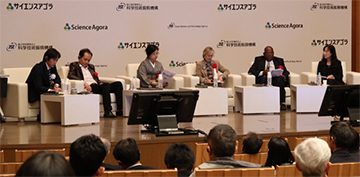
はじめに渡辺氏が、ビジョンの素案について、「一般市民から見ると、科学者は社会から少し分離された人物のように捉えられがちですが、本来、科学は社会の一部です。このビジョンはそれを踏まえ、科学がくらしと一緒になって未来を紡ぐイメージの共有を目指すものです」と説明しました。また、この観点から見た「科学と社会」を巡る課題の一例として、現在の科学研究は、学問の細分化やタコツボ化により、互いの専門領域が分かりづらくなっていること、現状においては専門領域の越境や研究推進のための社会的動機付けを得るのが困難であることを挙げ、「いかに各自が“当事者意識”を持って事の本質に迫った議論をできるか、また、責任と意思のある者同士が共に考え、行動につなげることを実現するにはどうすればよいかが重要」と、話題を提起しました。
To start off the discussion, Watanabe offered an explanation of the provisional vision "Discussing together, and thinking together - A future created through science and daily life" (Fig.1), saying, “From the perspective of the general public, scientists tend to be viewed as characters who are somewhat separated from society. However, science is essentially a part of society. Taking this perception into account, this vision (Fig.1) aims to share the image of science becoming one with daily life to create our future.” As an example of the issues surrounding science and society as seen from this perspective, she raised the example of how it is becoming increasingly difficult to distinguish between mutual fields of expertise in scientific research today, as a result of growing fragmentation and insulation of academic disciplines. Currently, it is difficult for scientists to cut across fields of specialization and have social momentum for promoting research. In light of this situation, she proposed, “It is important to consider how we can engage in discussions to pursue the essence of issues while maintaining our respective individual sense of ownership, and how those with a common sense of responsibility and will can come together to think and transform their thoughts into action.”
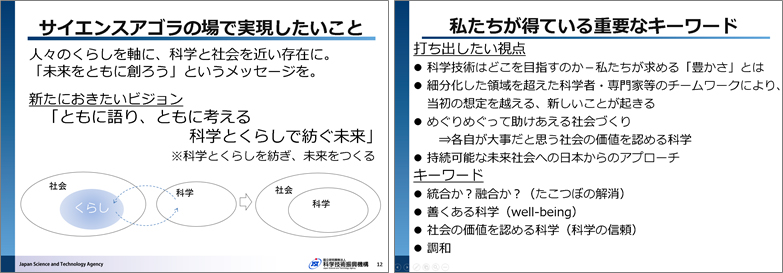
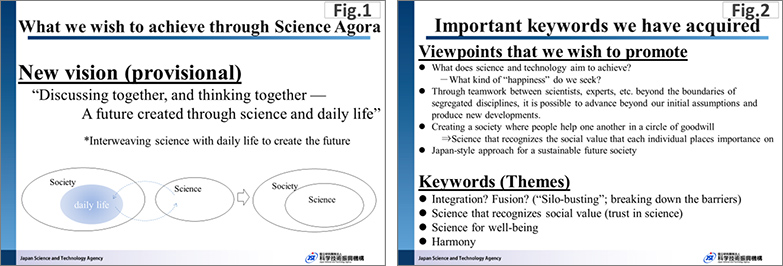
これを受け、発達障害の子どもと家族への早期支援など、社会の中で求められる取り組みを行いながら研究を続ける児童精神科医の神尾氏は、発達障害に限らず、最近の社会問題は非常に複雑で多様な領域に関わると指摘。研究者同士はもちろんのこと、当事者や地域のメンバー、行政等からの意見や考え方を科学研究のプロセスに取り込み、解決策や社会実装までの合意形成を共に形作ることが重要であると説きました。「そのためには、人によって“well-being”のあり方が異なることを、科学者は謙虚に受け止めなければいけません。研究室の中で得られたBest(最良)が社会の中でのBestではありません。自分の研究が社会の役に立つことを願わない研究者はいないと思いますが、個人の研究者の動機付けに頼っていては、おそらく社会全体のwell-beingの追求はできないでしょう」と述べ、新しい研究者像として、研究者個々人が新たな資質として統合的思考を持ち、かつ、領域を越えて協働するための有機的な仕組み作りが必要であると語りました。
In response to this, Yoko Kamio, Director, Department of Child and Adolescent Mental Health, National Institute of Mental Health, National Center of Neurology and Psychiatry (NCNP), a child psychiatrist who has been engaged in research work while implementing initiatives demanded by society, such as providing early support to children with developmental disorders and their families, pointed out the immense complexities not only in the field of developmental disorders, but also in recent social issues, as well as their links with a wide range of other areas. She explained the importance of incorporating the views and approaches of other researchers, the concerned parties, members of the local community, and the administration, into the processes of scientific research, and of working together to formulate solutions and build consensus leading up to social implementation. “To that end,” she said, “scientists must accept with humility the differences in people’s approaches toward the concept of ‘well-being.’ The ‘best’ outcome that we produce in the research laboratory may not be the ‘best’ for society. I believe there are no researchers who do not hope that their own research will be able to serve society. However, I do not think that it will be possible to pursue well-being for society as a whole if we were to depend on the motivations of individual researchers.” Hence, she pointed out the need to create an organic system that can enable collaboration across different disciplines, and described the new image of researchers as one where individual researchers are equipped with the new quality of possessing an integrated approach and way of thinking.
続いて、京都を拠点に、科学技術と建築やデザインを融合して社会変革に取り組む小野氏は、「細分化された学問を融合・統合して新しい学問を作ることは大変難しい」と切り出しました。そして自身が携わる京都市内の錦市場をリ・デザインする取り組みを紹介しながら、「専門性を持った人たちが、その都度の課題に応じて一つのプラットフォームに集まる“プロジェクト型”の進め方が良いと考えています」との見解を示しました。また、ある目的に対して現場に深く入り込み、エビデンスをもとに真の課題を見出すことが大切であり、その課題に最適な専門家を招集し、総力を挙げて課題解決にあたる手法が有効であると語り、「研究者として最も大事なことは、目的が達成されたと同時に立ち去るのではなく、対象となる地域社会とのつながりに継続的に目を配ることです」と指摘しました。
Next, Yoshiro Ono, Professor, KYOTO Design Lab CEO, Vice President, based in Kyoto and tackling social reform by fusing science and technology with architecture and design, broached on the difficulties of creating new academic disciplines by fusing and integrating segregated disciplines. He then introduced the initiative of redesigning Nishiki Market in Kyoto City that he has been involved in, and presented his view that “It is a good idea to adopt a project format, whereby people with expertise gather on a common platform corresponding with the issue that needs to be tackled each time.” He also explained the importance of identifying the real issues based on evidence by going deep into the site with a certain goal. He spoke about the effectiveness of a method that involves bringing together the best experts corresponding to the issue, and unifying their capabilities to solve the problem. He also pointed out that, “What is of greatest importance to a researcher is to continue to keep a watchful eye on contributing to the target local community, even after achieving the goal.”
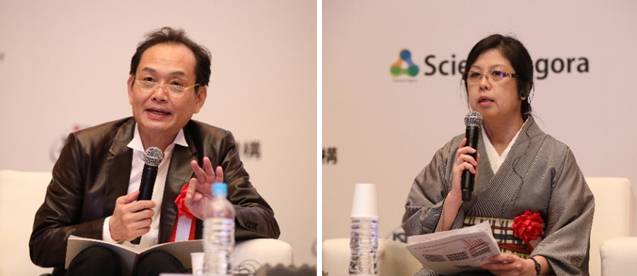
小野氏の錦市場の研究事例の中に、一般市民からのインプットを取り込む手法を見出し「とても興味深いアプローチ」と評したのは、フランス国立科学研究センターから来日したカンボン-トムセン氏でした。科学者は、自分の研究から一歩下がって一般市民の意見に耳を傾けることで多くを学べると述べました。そして、その際に、日本文化の特徴である「調和」「和」の考え方を盛り込むのもよいだろうと提案し、それを可能にするサイエンスアゴラという場の意義に触れました。また、科学者たちが勇気を持って分野をまたいで活動することの必要性を強調し、そのためには科学者にとってのwell-beingについても、今後しっかり考えていくことが大切だと語りました。
Anne Cambon-Thomsen, Emeritus Research Director, National Center for Scientific Research (CNRS), France, / Champion of the EuroScience Open Forum (ESOF) 2018 to attend this forum in Japan, appraised the method of incorporating input from the general public in the case of Ono’s research on Nishiki Market as a “very interesting approach.” She commented that we could learn much by taking a step back from our own research and listening to the views of the general public. In doing so, she suggested that it may be a good idea to also incorporate the concepts of “harmony” and “peace” that are characteristic of Japanese culture, and touched on the significance of Science Agora as a space for enabling that. She also emphasized the need for scientists to have the courage to take up activities across different disciplines, and to that end, spoke about the importance of giving serious consideration to taking into account in the evaluation process of the activity of scientists, the interdisciplinary actions and the actions in interaction with various publics.
南アフリカから訪れた科学技術振興庁長官のヌケリ氏は、科学教育に長年携わった経験から、自分たちがどのような問題に直面しているのか、何が自分たちの日々の生活に影響を及ぼしているのかを考える上で、一般市民にも科学を理解してもらいたいと訴えました。「科学技術を一般市民に理解してもらうためには、社会と科学の双方向の対話が欠かせません。官民の連携に加え、先進国と途上国、都市部と農村部を橋渡しする役割を担うものが求められます」との視点を紹介し、そうした役割の一端を担うサイエンスアゴラのような場が、今後、アフリカでも開催されるよいと述べました。一方で、科学者の側も学問レベルに留まらず、社会のニーズを理解して社会的動機付けを持つことが重要であると説き、科学と社会に共通する意義ある成果に対して、より多くの投資が必要であると指摘しました。
Jabu Nukeri, Executive Director, Office of the Managing Director, South African Agency for Science and Technology Advancement (SAASTA), South Africa, from his experience with many years of involvement in the field of scientific education, urged the general public to have a deeper understanding of science in considering the types of problems that we face, and the issues that have an impact on our daily lives. He introduced the perspective that “Two-way dialogue about society and science is vital to having the general public gain an understanding of science and technology. In addition to facilitating collaboration between the public and private sectors, such dialogue must also serve the role of bridging developed and developing countries, and urban and rural communities.” He commented that it would be good for a forum like Science Agora, which fulfills such a role, to also be convened in Africa in the future. On the other hand, he also pointed out the importance for scientists to move beyond the academic level in order to grasp an understanding of society’s needs and acquire social motivation. He touched on the need to put even greater investment into research output that holds significance for both science and society.
4名から述べられた意見を受け、フロア参加者からもいくつかのコメントがありました。その一つに、「科学や社会を大きな塊として見てはいないだろうか」という指摘がありました。「実際は、科学の側にもテレビ番組になってエンターテインメントとして楽しまれる部分もあれば、学術的に貢献する部分もあるなど、多様な構成要素があります。それに対する社会側の受け止め方もさまざまで、ときには科学者の見方が受け入れられないこともあるでしょう。そうした個々の構成要素を見ていかなければ、科学と社会の問題は解決しないのではないでしょうか?」との発言がなされました。この発言を受け、神尾氏は、似非科学の問題を一つの事例として取り上げ、特に日本の場合は、メディアの情報が溢れ、正しい情報のプライオリティづけがなされていないと指摘。正しい科学の情報と似非科学の違いを伝えるメディアの役割がますます重要であると同時に、研究者の側にも、論文発表後の正しい科学情報の流通にまで注意を払う役割があるとの考えを示しました。
Participants from the floor gave several comments in response to the remarks from the four panelists. One of these was the criticism that “science and society are being perceived as a large mass.” The participant commented, “In actual fact, science comprises a wide variety of components, including parts that can be enjoyed as a form of entertainment on TV programs, and parts that can contribute to academic research. The ways in which society receives these components varies, and within these, the perspectives of scientists are sometimes not accepted. If we do not look at these individual component elements, wouldn’t it be impossible to solve the issues confronting science and society?” In response to this, Kamio used the problem of “pseudo-science” as an example, and pointed out that particularly in the case of Japan, there is a surfeit of information in the media, and accurate information is not given priority. According to Kamio, while media plays an increasingly important role in communicating the differences between accurate scientific information and pseudo-science, researchers also have the duty of paying attention to ensure the distribution of accurate scientific information after the publication of academic papers.
一方で、「一般市民は、科学者の見方を全て知る必要があるのか?」という問いかけもありました。これに対し、カンボン-トムセン氏は「難しい質問ですね」と考えつつ、「細かな研究の内容や手法まで理解してもらう必要はないでしょうが、私たちがエビデンスに基づいて研究をしているということだけは理解してほしい。また、研究活動をとても好きで行っていることも知ってもらいたいですね。そんな理解を通じて、私たち科学者が、何らかの形で一般市民の間に科学者に対する信頼感を育くむことができれば良いですし、もっと踏み込んで、私たちが見ているデータは美しく、データの解析も美しいことをいずれ理解してもらえたなら、もっと嬉しい」と答えました。
On the other hand, a question was also raised about whether it was necessary for the general public to learn about all the perspectives of scientists. In response to this, Cambon-Thomsen explained that while this was a difficult question to answer, she felt that “While it is probably not necessary for the general public to have an understanding of a detailed understanding of the research contents and methods, I would like them to understand that I am conducting research based on evidence. I would also like them to realize that I am engaged in research work because I enjoy the research activities very much. Through such understanding, it would be good if the general public could develop some form of trust toward scientists, and going further, I would be even happier if they could understand the beauty in the data that we study, as well as the beauty in the analysis of such data.”
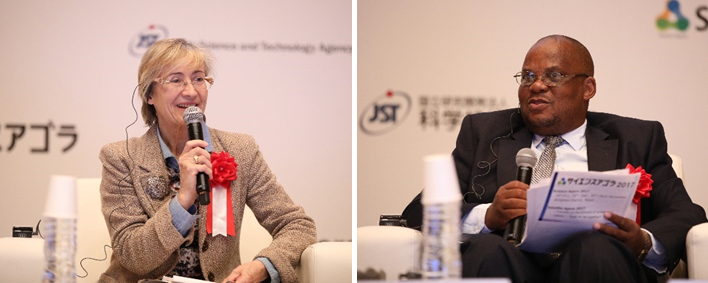
最後に、ユーロサイエンス事務局長のティンデマンス氏が登壇し、このパネル討論を総括すると共に、今後のサイエンスアゴラについて、「科学の視点の重要性を社会に理解してもらうこと」「科学の役割を明確にすること」「場を活かすこと」の3点に着目したアドバイスを投げかけました。まず、科学の視点の重要性を理解してもらうために、「科学者は自分たちの研究やその成果を一方的に語るのではなく、いろいろな分野の科学者がそれぞれの視点を開示し、一般の人たちと話し合う場を持つことが重要です」と述べました。次に、「これまで社会における科学の役割が具体的に明示されず、一般論に終始していた」状況を振り返り、「例えば、遺伝子、エネルギー、水などの具体的な問題に、科学がどのような役割を担うのか、事例をもって明らかにしていく必要があります」と語りました。さらに、ヨーロッパ各国で行われている学生会議を紹介しながら、「さまざまな分野の代表団が集まり、ある特定の問題を解決に向けて討議する場を設けてはどうか」と提案。サイエンスアゴラという場をさらに活かしていくための可能性を示し、パネル討論を締めくくりました。
Finally, Peter Tindemans, Secretary General, EuroScience, took the rostrum to summarize the panel discussion. He also offered advice focusing on three points for future Science Agora: Helping society gain an understanding of the importance of a scientific perspective, clarifying the role of science, and taking advantage of the space offered by this forum. Firstly, to help society gain an understanding of the importance of a scientific perspective, he explained, “It is important for scientists in various fields to present their respective viewpoints and provide a space for the general public to engage in dialogue, rather than for scientists to talk one-sidedly about their research and research achievements.” Next, he reflected on the failure to clarify the role of science in society to date, and how discussions had only considered general theories. He explained, “It is necessary to clarify the role that science serves by using examples in concrete issues such as genetics, energy, and water.” Furthermore, he introduced the student conferences that are held across Europe, and proposed that representative groups from various disciplines come together to establish a space for discussing solutions to a specific problem. He closed the panel discussion by touching on the potential of Science Agora as a space that can be further utilized in the future.
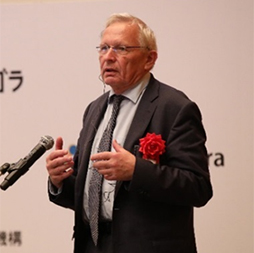
この後、サイエンスアゴラ2016への出展企画の中から各賞が選ばれました。機関独自の視点で選考する日本学生支援機構 東京国際交流館賞およびフジテレビ賞は各1企画に、継続的に多数のステークホルダーの参画を得る工夫をした模範的な活動に贈られるJST賞は6企画に決定し賞状が授与されました。
http://www.jst.go.jp/sis/scienceagora/reports/2016/prize/
After this, the winners for the respective awards were selected from the participants in Science Agora 2016. One project was selected for the JASSO TIEC Award and the Fuji Television Award respectively, from the unique perspective of the institution, while six projects were selected and presented with the JST Award, which commends model activities that have put effort into gaining the continuous involvement and participation of many stakeholders.
→ Link to the respective Science Agora 2016 Awards (in Japanese)
http://www.jst.go.jp/sis/scienceagora/reports/2016/prize/
香川高等専門学校技術教育支援センター高松キャンパス、生物多様性保全協会、ふくしまサイエンスぷらっとフォームspff、南相馬サイエンスラボ、畿央大学 サイエンスコミュニケーションサークルKSCC、ミニ・エクスプロラトリアムを創る会
National Institute of Technology, Kagawa College
Technical Education Support Center, The Japan Biodiversity Association, science platform in fukushima, Minami-Soma Science Lab., Kio university science communication circle, miniexplo GROUP
South African Agency for Science and Technology Advancement (SAASTA)
畿央大学 サイエンスコミュニケーションサークル KSCC
Kio university science communication circle
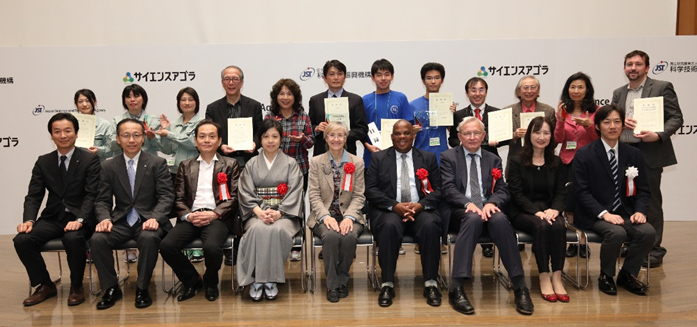
最後に、来るサイエンスアゴラ2017は、11月24日~26日3日間で行う予定であるとが発表されました。例年同様お台場地区での開催に加え、福岡をはじめとした全国各地での開催を検討しているそうです。「サイエンスアゴラは私たちだけではできません。来年もまた、みなさんと一緒につくり上げていきたい」との司会の言葉で、サイエンスアゴラ2016は幕を下ろしました。
To conclude, the scheduled dates for the upcoming Science Agora 2017 were announced as the three days from 24 to 26 November. In addition to the forum at the Odaiba district as in previous years, reviews are also underway to hold the forum in Fukuoka and other parts of Japan. The moderator closed Science Agora 2016 with these words, “We are not the only people involved in Science Agora. Next year, I hope that we can create this forum together once again.”
大局的に捉える科学と社会の関係というのは、世界共通なのだと感じます。属性をまたいだ相互対話の重要性は従来も訴えられてきたところであり、多くの実践が試みられてきましたが、本セッションでは、「社会における科学の役割が曖昧だった」という気づきが共有されました。これまで私たちが積み重ねた経験が、一つ一つの課題に対する具体的な科学の役割を探り合っていくことで、今後さらに深まることに期待したいです。また、なかなか難しいことですが、科学と社会のあり方を見つめる立場として、私自身も“当事者意識を持って”、今後の動向に注意を払いたいと思います。
I feel that it is common for people across the world to capture the relationship between science and society from a big-picture perspective. Attention has long been drawn to the importance of mutual dialogue that spans different attributes, and while many practical attempts have been made, through this session, we shared the realization that the role of science in society is an ambiguous one. Going forward, I hope that we can probe deeper into the experiences that we have built up till now by exploring the specific role of science with respect to each and every issue. While it may be very difficult to achieve in reality, I hope that we can maintain a sense of ownership and pay attention to future trends from our standpoints of examining the state of science and society.
文責:橋本裕美子(科学コミュニケーター)
Writer:Yumiko Hashimoto (Science Communicator)
下記のリンクからご覧ください。